 Operation and Maintenance
Operation and Maintenance
 Linux Operation and Maintenance
Linux Operation and Maintenance
 What are the Linux remote management tools?
What are the Linux remote management tools?
What are the Linux remote management tools?
Linux remote management tools include: 1. PuTTY, a completely free Windows remote management client tool; 2. SecureCRT, a powerful remote management tool; 3. Xshell, a very Powerful secure terminal simulation software; 4. WindTerm; 5. Tabby; 6. WinSCP; 7. MobaXterm; 8. FinalShell; 9. Terminus; 10. electerm; 11. OpenSSH, etc.

#The operating environment of this tutorial: linux7.3 system, Dell G3 computer.
As a programmer who often works with Linux systems, using the SSH terminal tool to remotely manage our servers is one of the essential daily tasks. Good tools are essential tools to improve work efficiency! Below I will introduce to you several common remote management tools based on the SSH protocol.
PuTTY remote management tool
This is a completely free Windows remote management client tool. It is small in size, easy to operate, and does not require installation (just download it) use).
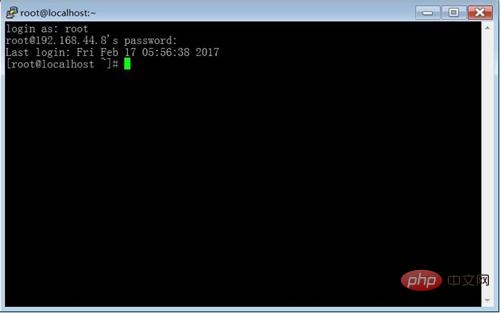
For friends who often go to customer companies for technical support and maintenance, this tool is very convenient to use. As long as you carry a USB flash drive with you, you can achieve "one disk at a time" Sign in anywhere with your phone."
PuTTY contains many components, such as:
PuTTY (remote login client).
PSCP (SCP client, copies files via SSH protocol at the command line).
PSFTP (command line client for SFTP, file transfer similar to FTP, based on SSH protocol).
PuTTYtel (just a Telnet client).
Plink (command line tool that can be used to execute commands on the remote server).
Pageant (SSH authentication agent for PuTTY, PSCP, Plink).
PuTTYgen (Tool for generating RSA and DSA keys).
Although there are so many components, the most commonly used one for beginners is PuTTY. Download PuTTY and double-click the putty.exe file, the configuration interface shown in Figure 1 will appear.

Figure 1 PuTTY configuration interface
Enter the remote login host IP address in the "Host name (or IP address)" text box, such as 192.168.8.88.
"Port" differs according to the protocol used (select different "Connection Type" options, the port will automatically change), generally select "SSH" or "Telnet", depending on the protocol provided by the Linux server Serve.
It is recommended to choose SSH. The Telnet service password will be transmitted in clear text, which is less secure. Currently, most UNIX/Linux systems disable Telent by default.
If you want to save the session for the next connection, you can enter a name in the "Saved Session" text box and click the "Save" button to save this connection configuration.
After the setting is completed, click the "Open" button, and the operation interface shown in Figure 2 will appear.

Figure 2 PuTTY operating interface
If you want PuTTY to support Chinese display, the modification method is: set the item on the right side of "Window->Conversion" Select "UTF-8" from the "Remote Character Set" drop-down list box, as shown in Figure 3.
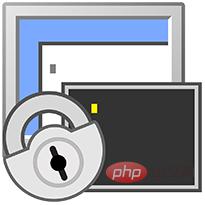
Figure 3 PuTTY supports Chinese display
SecureCRT remote management tool
SecureCRT is a powerful remote management tool , this software combines the secure login and data transfer performance of SSH (Secure Shell) with the reliability, usability and configurability provided by Windows terminal emulation.
SecureCRT supports SSH, as well as Telnet and rlogin protocols. SecureCRT is an ideal tool for connecting to Windows, UNIX and VMS. Encrypted files can be transferred by using the included VCP command line program. Network workers should be familiar with this software and often use it to connect devices.

The advantage of using this tool is that you can easily remember multiple addresses when managing multiple servers, and you can set up automatic login, which facilitates remote management and is very efficient. . However, compared with PuTTY, SecureCRT requires installation and is a shareware that cannot be used without paid registration (there are some registration codes scattered on the Internet, readers can search and use them by themselves).
After installing SecureCRT and starting it, click the "Quick Connect" button, enter the IP address and user name, and enter the password as prompted to log in, similar to PuTTy, as shown in Figure 4.
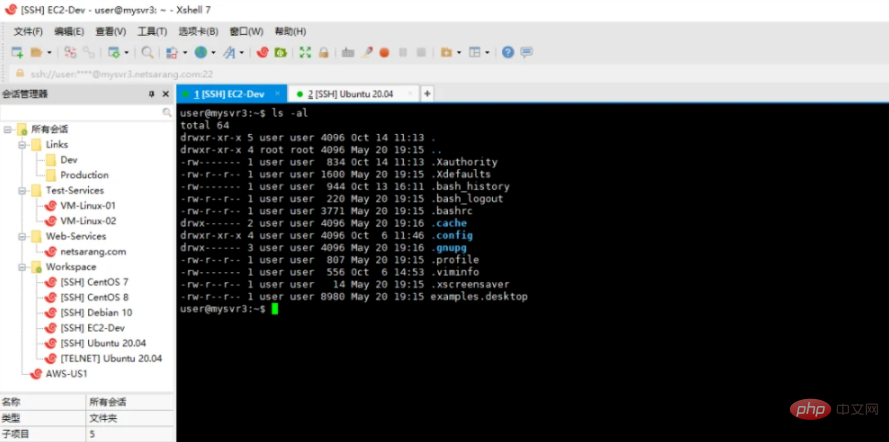
Figure 4 SecureCRT use
SecureCRT does not support Chinese by default (Chinese will be displayed as garbled characters). One solution is: after establishing the connection, enter the "Options" menu and select "Session Options", select "Xterm" in the "Terminal" drop-down list box on the right side of "Terminal -> Emulation", check the "ANSI Color" checkbox to support color display, and click the "OK" button. As shown in Figure 5.

Figure 5 SecureCRT simulation settings
Select "Traditional" in the "Current Color Scheme" drop-down list box on the right side of "Terminal->Appearance" )", select Chinese fonts for both "Standard Font" and "Exact Font", such as New Song Dynasty or Kai Ti, and ensure that "Character Encoding" is selected as "UTF-8" (the default Chinese character set used by CentOS is UTF-8), Uncheck the "Use Unicode lines to draw characters" checkbox and save, as shown in Figure 6.

Figure 6 SecureCRT appearance settings
Xshell
xshell is a very powerful secure terminal simulation software that supports SSH1, SSH2, and Windows platforms TELNET protocol. Xshell can be used under the Windows interface to access remote servers under different systems, thereby better achieving the purpose of remote control of the terminal.

Official website: https://www.xshell.com/zh/xshell/
- ##X11 -forwarding: supports
- Zmodem(rz, sz): supports
- sftp: supports
- 中文:Support
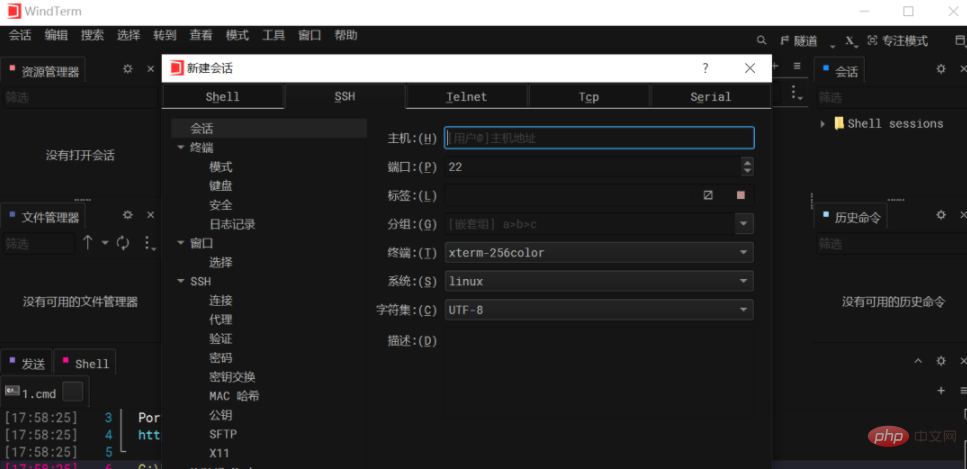
https://github.com/kingToolbox/WindTerm/
- X11-forwarding : Support ##Zmodem(rz, sz) : Support
- sftp : Support
- Chinese :Support
- Tabby
Tabby (formerly Terminus) is a highly configurable terminal emulator, SSH and serial client for Windows, macOS and Linux.
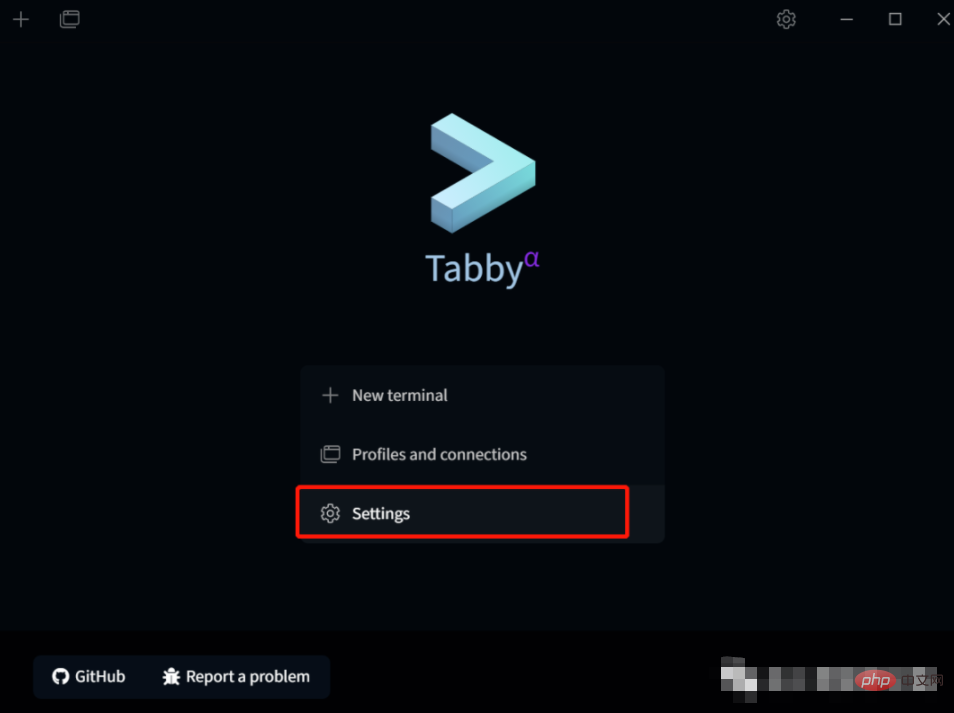 Official website:
Official website:
##Zmodem(rz, sz) : Support
sftp : Support
Chinese : Not supported
WinSCP
WinSCP is an open source graphical SFTP tool client that uses SSH in a Windows environment. Also supports SCP protocol. Its main function is to securely copy and transfer files between local and remote computers.
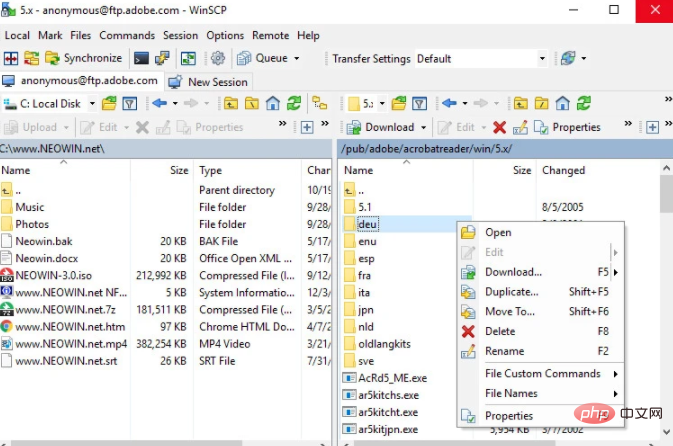 MobaXterm
MobaXterm
mobaxterm is very comprehensive and provides almost all important Remote network tools (such as SSH, X11, RDP, VNC, FTP, MOSH, etc.), as well as Unix commands on the Windows desktop (bash, ls, cat, sed, grep, awk, rsync, etc.), sftp mode is enabled by default after logging in.
Official website:mobaxterm.mobatek.net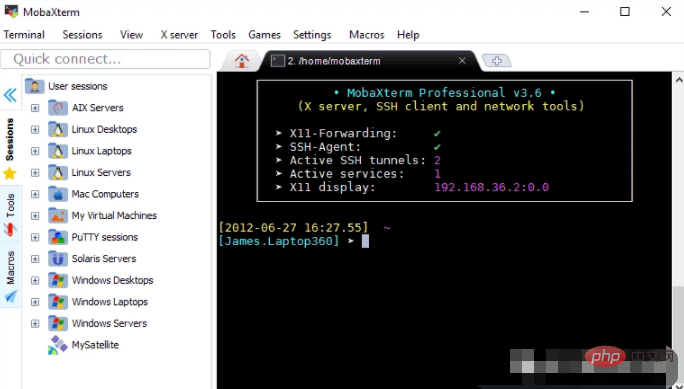
FinalShellFinalShell is an integrated server network management software (written in Java language), not only an ssh client, FinalShell is also a powerful development and operation and maintenance tool that fully meets the development and operation and maintenance needs of users.
Main features
Multi-platform support Windows, Mac OS X, Linux
Memory, CPU performance monitoring, Ping delay packet loss, Trace routing monitoring
Support rz, sz (zmodem)
-
Official website:
http://www.hostbuf.com/
Zmodem(rz, sz) : Support
sftp : Support
Chinese : Support
Terminus
Terminus is a highly configurable terminal emulator with support for themes, color schemes, fully configurable shortcuts, split panes, tab memory, and integration support SSH client and connection manager (supports x11 forwarding)
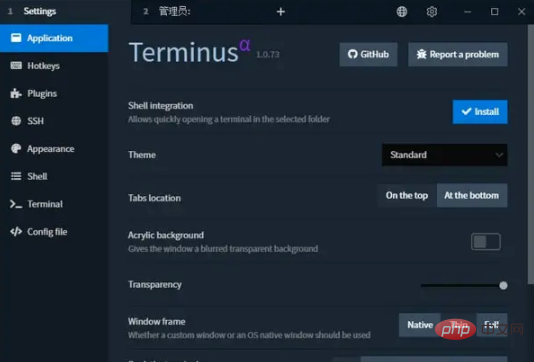
System: Windows, Linux, Mac
Official website: https://eugeny.github .io/terminus/
X11-forwarding: supports
Zmodem(rz, sz): supports
sftp: Not supported
Chinese: Not supported
electerm
electerm is a terminal and file management Server, SSH/SFTP client (linux, mac, win), based on components such as electron/ssh2/node-pty/xterm/antd. It can save host address, user name, password, port number and other information, and supports using password and private key to log in.
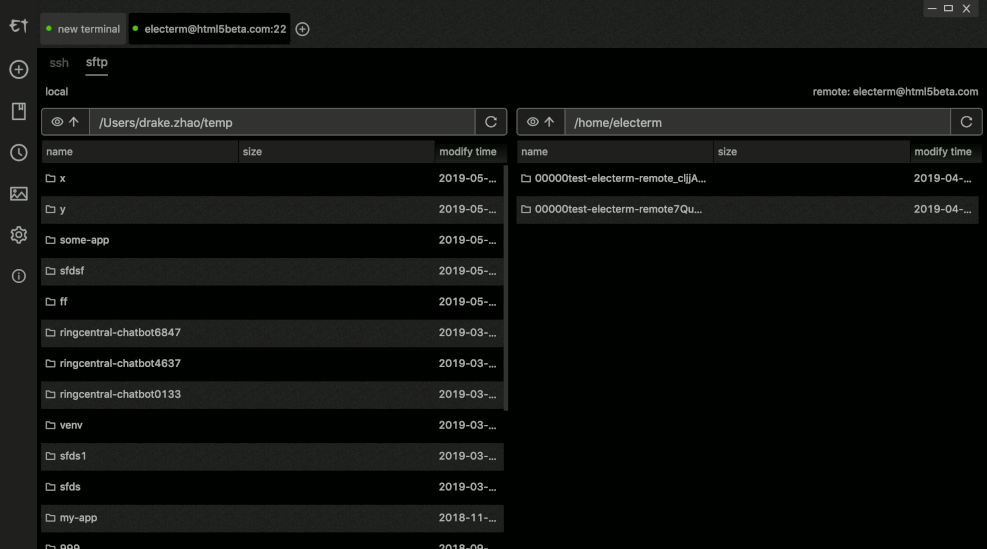
Official website: https://electerm.github.io/electerm/
- ##X11-forwarding : Support ##Zmodem(rz, sz) : Support
- sftp : Not support
- Chinese: Support
- OpenSSH
OpenSSH is the premier connection tool for remote login using the SSH protocol. It encrypts all traffic to eliminate eavesdropping, connection hijacking, and other attacks. Additionally, OpenSSH provides extensive secure tunneling capabilities, multiple authentication methods, and complex configuration options.
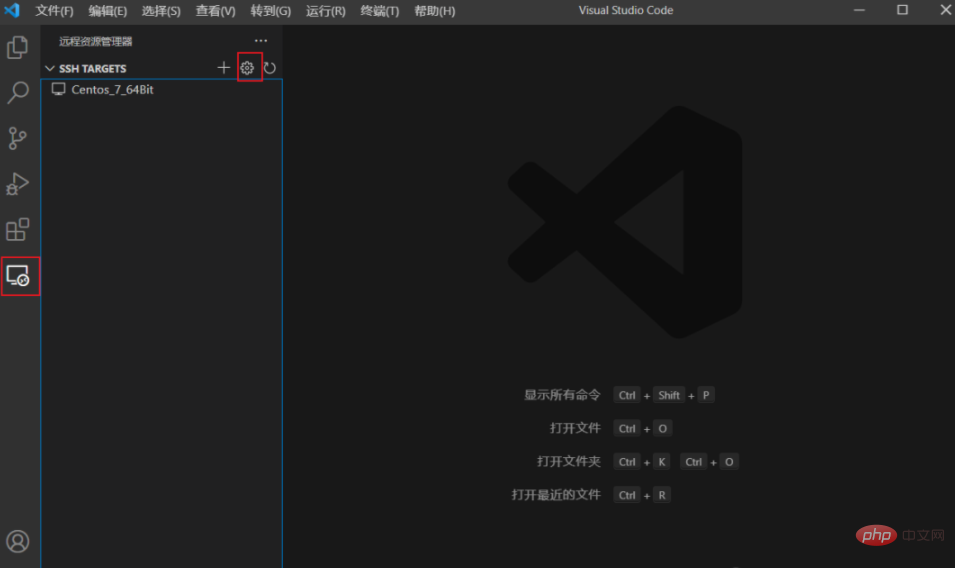 Official website: http://www.openssh.com/
Official website: http://www.openssh.com/
- Zmodem(rz, sz): Not supported
- sftp: Supported
- Chinese: Supported
- vscode remote-ssh
Official website: https://marketplace.visualstudio.com/items?itemName=ms-vscode-remote.remote-ssh
##Zmodem(rz, sz): does not support
sftp: does not support
Chinese: Not supported
-
Related recommendations: "
Linux Video Tutorial "
The above is the detailed content of What are the Linux remote management tools?. For more information, please follow other related articles on the PHP Chinese website!

Hot AI Tools

Undresser.AI Undress
AI-powered app for creating realistic nude photos

AI Clothes Remover
Online AI tool for removing clothes from photos.

Undress AI Tool
Undress images for free

Clothoff.io
AI clothes remover

Video Face Swap
Swap faces in any video effortlessly with our completely free AI face swap tool!

Hot Article

Hot Tools

Notepad++7.3.1
Easy-to-use and free code editor

SublimeText3 Chinese version
Chinese version, very easy to use

Zend Studio 13.0.1
Powerful PHP integrated development environment

Dreamweaver CS6
Visual web development tools

SublimeText3 Mac version
God-level code editing software (SublimeText3)

Hot Topics
 1676
1676
 14
14
 1429
1429
 52
52
 1333
1333
 25
25
 1278
1278
 29
29
 1257
1257
 24
24
 Linux Architecture: Unveiling the 5 Basic Components
Apr 20, 2025 am 12:04 AM
Linux Architecture: Unveiling the 5 Basic Components
Apr 20, 2025 am 12:04 AM
The five basic components of the Linux system are: 1. Kernel, 2. System library, 3. System utilities, 4. Graphical user interface, 5. Applications. The kernel manages hardware resources, the system library provides precompiled functions, system utilities are used for system management, the GUI provides visual interaction, and applications use these components to implement functions.
 How to check the warehouse address of git
Apr 17, 2025 pm 01:54 PM
How to check the warehouse address of git
Apr 17, 2025 pm 01:54 PM
To view the Git repository address, perform the following steps: 1. Open the command line and navigate to the repository directory; 2. Run the "git remote -v" command; 3. View the repository name in the output and its corresponding address.
 How to run java code in notepad
Apr 16, 2025 pm 07:39 PM
How to run java code in notepad
Apr 16, 2025 pm 07:39 PM
Although Notepad cannot run Java code directly, it can be achieved by using other tools: using the command line compiler (javac) to generate a bytecode file (filename.class). Use the Java interpreter (java) to interpret bytecode, execute the code, and output the result.
 How to run sublime after writing the code
Apr 16, 2025 am 08:51 AM
How to run sublime after writing the code
Apr 16, 2025 am 08:51 AM
There are six ways to run code in Sublime: through hotkeys, menus, build systems, command lines, set default build systems, and custom build commands, and run individual files/projects by right-clicking on projects/files. The build system availability depends on the installation of Sublime Text.
 What is the main purpose of Linux?
Apr 16, 2025 am 12:19 AM
What is the main purpose of Linux?
Apr 16, 2025 am 12:19 AM
The main uses of Linux include: 1. Server operating system, 2. Embedded system, 3. Desktop operating system, 4. Development and testing environment. Linux excels in these areas, providing stability, security and efficient development tools.
 git software installation
Apr 17, 2025 am 11:57 AM
git software installation
Apr 17, 2025 am 11:57 AM
Installing Git software includes the following steps: Download the installation package and run the installation package to verify the installation configuration Git installation Git Bash (Windows only)
 laravel installation code
Apr 18, 2025 pm 12:30 PM
laravel installation code
Apr 18, 2025 pm 12:30 PM
To install Laravel, follow these steps in sequence: Install Composer (for macOS/Linux and Windows) Install Laravel Installer Create a new project Start Service Access Application (URL: http://127.0.0.1:8000) Set up the database connection (if required)
 How to set important Git configuration global properties
Apr 17, 2025 pm 12:21 PM
How to set important Git configuration global properties
Apr 17, 2025 pm 12:21 PM
There are many ways to customize a development environment, but the global Git configuration file is one that is most likely to be used for custom settings such as usernames, emails, preferred text editors, and remote branches. Here are the key things you need to know about global Git configuration files.



